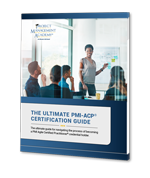PMI-ACP Certification Exam Overview
On this page:
- Value of industry certifications for early-career project management professionals
- Understanding early career credential options: CAPM vs PMI-ACP
- Certified Associate in Project Management (CAPM)® Overview
- Project Management Institute Agile Certified Practitioner® (PMI-ACP) Overview
- CAPM vs. PMI-ACP | Similarities and Differences
- CAPM vs PMI ACP: Which Certification is Right for You?

Download the Ultimate Guide to learning about the PMI-ACP Certification.
Understanding the PMI-ACP Exam
As a project manager, you know the importance of staying up to date with the latest tools and techniques for running projects. If you’re a PMP® certified project manager, you also know that you need continuing education credits to maintain your certification. Whether pursuing certification for the first time or seeking continuing education credits, the Project Management Institute – Agile Certified Practitioner (PMI-ACP) certification may be right for you.
Agile project management is no longer limited to IT and software development projects; it is now used across various industries because it is less rigid and can quickly adapt to changing needs. A PMI-ACP certification makes you stand out from your peers as organizations adopt Agile practices.
The PMI-ACP certification covers the various methodologies under the Agile umbrella, including Scrum, Kanban, Lean, and Extreme Programming (XP). To pass the exam, you need a thorough understanding of these methodologies and which method to use in a project management scenario.
On the surface, the PMI-ACP certification may come across as out of reach, especially if you do not have extensive experience with Agile. However, suppose you have a solid strategy in place to learn. In that case, you will be able to meet the challenges of this certification and grow a broader project management skill set that will open new opportunities for you to pursue.
We will briefly examine the PMI-ACP exam itself, its prerequisites, and the cost of PMI-ACP certification. To help you build a strategy to pass the exam, we will look at the format, the factors that might make it difficult, and the strategies you can use once you feel ready.
Agile Methodologies: PMI-ACP’s Core
Agile contains several methods you can select from depending on your project. PMI-ACP covers multiple Agile methods to provide a solid and comprehensive foundation. You can use Agile with the more traditional waterfall method, or if your project needs a less stringent approach, you can use Agile on its own. To pass the exam, you need to understand the following:
• Scrum: Scrum is the best project management solution for complex product delivery. It promotes team collaboration and iterative progress toward a well-defined goal.
• Kanban: Originating in Japan, Kanban is a visualization tool that facilitates efficient workflow and minimizes waste. It promotes real-time communication and complete transparency.
• Lean: Emphasizing a value-driven approach, Lean focuses on improving system-wide efficiency and reducing waste. It promotes continuous improvement, precision, and consistency.
• XP (Extreme Programming): XP is a software development approach with a customer-centric focus, emphasizing frequent “releases” in short development cycles intended to improve productivity and accommodate changing customer needs.
Erin Aldridge PMP® PMI-ACP, our project management subject matter expert, states that “PMI places significant focus on the discipline of Scrum in their Agile exams, unlike some of the other Agile approaches. While ACP candidates should have a basic understanding of Lean and Extreme programming, they don’t need an in-depth knowledge of the smaller, less common agile approaches.”
PMI-ACP Prerequisites
As with many certifications, PMI-ACP has several prerequisites you must meet before applying to sit the exam. Prerequisites are essential to pursuing certification as they provide the foundational knowledge you need to understand the content covered on the exam. The prerequisites for PMI-ACP are:

PMI-ACP Cost
The PMI-ACP exam costs $495 if you are not a member of the Project Management Institute and $435 if you are a member.
PMI-ACP Exam Format
To best prepare to take the PMI-ACP exam, you need to know what to expect when you take it. The PMI-ACP exam has 120 questions with a 3-hour time limit.
The exam has questions across seven domains, each comprising a different percentage of items on the exam. The domains and their percentage of items on the exam are:
Domain Percentage of Exam
Domain I: Agile Principles and Mindset 16%
Domain II: Value-driven Delivery 20%
Domain III: Stakeholder Engagement 17%
Domain IV: Team Performance 16%
Domain V: Adaptive Planning 12%
Domain VI: Problem Detection and Resolution 10%
Domain VII: Continuous Improvement (Product, Process, People) 9%
One thing to note is that only 100 of the questions are scorable. PMI monitors the other twenty questions to determine their performance before adding them to the databank of questions for future exams.
This exam tests both your theoretical knowledge and how you handle different project management scenarios using Agile. To pass the exam, you need to achieve a minimum score of 70%.
Factors Influencing Difficulty
Now that you know the exam format, you may wonder how difficult the exam is to pass. The difficulty level varies from person to person due to several different factors. To determine how difficult the exam might be for you, you should ask yourself the following questions:
· Do you have prior experience with Agile principles and methodologies?
· Do you have good study skills and exposure to certification exams?
· Do you have experience with the style of questions on the exam?
Understanding and acknowledging your experience level helps you create a strategy that enables you to achieve your PMI-ACP certification. Let’s examine these factors and how they can affect your PMI-ACP exam experience.
Agile Experience Level
If you are pursuing the PMI-ACP certification and have experience applying Agile tools, techniques, and practices, that knowledge will be helpful. Your experience will help you interpret and solve the project scenarios that are a part of the exam. However, even with Agile experience, the PMI-ACP exam can still be challenging.
For those without extensive experience with Agile, it can be a steep learning curve. Still, with time and effort, it is not an insurmountable challenge. You will need to invest significant time to learn and study the language, principles, methodologies, and tools associated with Agile.
Study and Preparation
Because the exam’s scope is expansive, you need a systematic and focused study schedule that gives you the time to understand Agile’s principles, methodologies, tools, and techniques before sitting the exam. Last-minute cramming won’t provide you with the time you need to gain a command of the material the exam covers.
There are many resources available that you can use to help you prepare for the PMI-ACP exam. One of the best resources you can choose is taking a PMI Agile Certified Practitioner course. Led by experienced Agile project management professionals, this course guides you through the critical information you need to learn and understand to pass the exam successfully. In addition to taking a course, there are many additional books, videos, forums, and discussion groups that you can access to help you prepare as well.
According to Erin Aldridge PMP®, PMI-ACP our project management subject matter expert, you are ready to take the exam “…if you can read the exam content outline available on PMI’s website and, in your own words, describe each topic and concept along with their significance in a project or impact their on an organization…then you’re likely well-prepared to take the exam.”
Once you have had time to study, taking practice exams is another essential part of exam preparation. Practice exams mimic the actual exam and its time constraints—this is especially valuable if you haven’t taken a certification exam before or it has been a long time since you did. Taking practice exams will help you pinpoint areas where you need to study more, giving your study time a sharper focus.
Various exam preparation options give you the best chance to pass your PMI-ACP exam, even without extensive Agile experience.
Nature of Questions
It is important to reiterate the nature of the questions you will face when taking the PMI-ACP exam. The focus of the exam is on the application of Agile concepts in hypothetical scenarios. Because of this approach, you need to showcase an Agile mindset utilizing methodologies from Scrum to Lean that go beyond simple memorization—you need to be able to showcase an Agile mindset.
Test-Taking Strategy
Like any certification exam, managing your time is critical to finishing the exam. When taking the PMI-ACP exam, having a strategic plan for completing the exam is essential. There are several strategies you can employ when taking your exam; they include:
• Pace Yourself: Don’t rush through the questions. To maintain focus during the exam, move steadily from question to question.
• Question Prioritization: Answer questions you are most confident about first and earmark the remaining questions to answer for later. Using this method, you will optimize your time during the exam by not focusing too long on questions you are unsure about initially.
• Keep Track of Time: Periodically, check the clock to know how much time is available. Keeping track of time will allow you to adjust your questions strategy depending on how much remains.
• Allocation for Review: As a part of your exam time strategy, make sure you have allocated enough time at the end of the exam to review your answers so that you can make changes if necessary.
By working strategically within the exam’s timeframe, you stand the best chance of completing all the questions with time to review at the end. Properly managing your time can differentiate between successfully passing the exam or failing.
PMI-ACP vs. PMP: Which is more challenging?
If you are a PMP® certified project manager, you may wonder how difficult the PMI-ACP exam is by comparison. Both exams have unique challenges for those who take them. The PMP certification exam focuses on the traditional waterfall model, meaning you need a deep understanding of project management concepts, terms, and best practices. The PMI-ACP exam focuses on Agile, meaning you need a comprehensive knowledge of its practices, tools, and techniques to apply the appropriate Agile principle to the scenario presented in the questions. Ultimately, however, the difficulty of each exam depends on your familiarity and experience with the respective methodologies and the amount of time you prepared beforehand.
Conclusion
The PMI-ACP exam is challenging whether you have experience with Agile methodologies or are new to them. Having extensive experience with Agile before pursuing the certification will benefit you as you will understand Agile and how to apply it to various scenarios. If you have limited experience with Agile, the exam will be more difficult but not impossible if you create a structured study plan.
Because the exam emphasizes scenario-based questions, you should understand Agile’s principles and methodologies. Like other certification exams, its difficulty level directly correlates to the time and effort you put into preparing. In addition to studying, it is essential that you have strategies in place to manage your time during the exam.
Achieving PMI-ACP certification will open new career paths in project management, differentiating yourself from your peers. Contact us to help you begin your journey to a new phase in your project management career!



 New Horizons
New Horizons
 Project Management Academy
Project Management Academy
 Six Sigma Online
Six Sigma Online
 Velopi
Velopi
 Watermark Learning
Watermark Learning
 Login
Login



 New Horizons
New Horizons
 Project Management Academy
Project Management Academy
 Velopi
Velopi
 Six Sigma Online
Six Sigma Online
 Watermark Learning
Watermark Learning